You’re scheduled to take a polygraph test soon. It is used in many settings – from criminal investigations to employee screening. While polygraphs don’t directly detect lies, they measure changes in physiological indicators like blood pressure, pulse, and respiration that may suggest deception.
As you prepare for your test, you likely have some nerves and unanswered questions. The examiner administering your test plays a key role in the process. Asking the right questions can help you better understand what to expect, feel more comfortable during the actual test, and maximize the accuracy of the results.
Before the Test
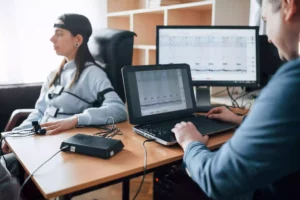
Use the opportunity before the test begins to get information from the examiner and set the right tone. Here are some recommended questions:
What is your background and qualifications?
Find out about the examiner’s education, training, and experience. Most reputable examiners will have a background in law enforcement or government agencies. You want someone who is properly licensed in your state and has significant, ongoing experience.
What will happen during the test?
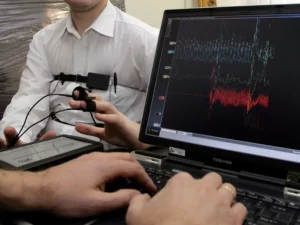
The examiner should walk you through the full process step-by-step, from the pre-interview to the administering of the actual test to the follow-up after. Knowing what to expect can help you feel less anxious. Common steps include:
- Pre-interview to review questions and establish a baseline
- Connecting you to the polygraph equipment
- Asking test questions and recording your physiological responses
- Post-interview to review results and any significant reactions
What types of questions will you ask?
The most accurate polygraph tests focus on no more than 4-5 relevant questions. The examiner should review the exact questions they intend to ask so there are no surprises. Be sure you understand each question fully. If a question seems unclear or overly broad, request clarification.
What measures are used to maximize accuracy?
No test is foolproof, including polygraphs. But a thorough, experienced examiner will use validated techniques to boost accuracy and reduce errors. These include:
- Comparing reactions to both control and relevant questions
- Adjusting for individual differences in normal physiologic responses
- Asking the same relevant questions multiple times in different ways
Ask how the examiner will apply these methods during your test. Also ask if they will use numerical scoring or global analysis to evaluate responses. Both approaches have pros and cons.
How long will the test take?

Polygraph exams can range from 60-90 minutes or longer. Understanding the anticipated timing can help you mentally prepare. Ask the examiner how long they expect your test will take from start to finish. Also confirm you can take breaks as needed.
Is there anything I should do to prepare?
Your examiner may recommend steps like getting a good night’s rest, avoiding heavy meals right before, and staying hydrated. Ask if they have any specific advice on how best to prepare for your test type.
During the Actual Test
Once the polygraph begins, stay focused and use it as a chance to clarify anything that still seems uncertain.
Would you remind me what you will measure during the test?
As the examiner connects you to the polygraph equipment, have them point out what each component tracks. The key measures are generally:
- Blood pressure
- Pulse
- Respiration
- Skin conductivity (sweat)
Seeing the sensors and understanding what they monitor can help the process feel more transparent.
Do you see any unusual baseline readings so far?
Before asking the main questions, the examiner will establish your normal physiology with some neutral questions. If they notice any atypical baseline reactions, ask the examiner to explain what they mean. Don’t just assume it implies deception. There may be an innocent explanation like anxiety, medication, or health conditions.
I’m confused by the wording of question X – could you rephrase it?
Don’t try to power through questions that seem unclear or leave too much open to interpretation. The examiner can then reword them to ensure you know exactly what is being asked. Stick to “yes” or “no” answers and answer each question individually.
How will you interpret any significant reactions I have?
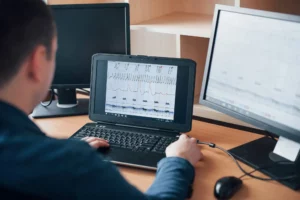
Not every fluctuation in your physiology during the test automatically indicates lying. There may be other reasons for changes like being nervous, having to pee, or feeling cold and shivering. Ask how the examiner distinguishes benign causes from true deception. Also find out if they will discuss any concerning reactions with you to understand them better.
At what point are we able to take a short break?
The examiner should allow brief breaks as needed without it overly impacting the test validity. If you feel the need to stretch, use the restroom, or just collect yourself for a minute, inquire about the best time to pause the test. Don’t try to power through discomfort.
Post-Test Follow-Up
Once the polygraph is complete, you want to understand the results and how they will be used. Seize this opportunity to gain that clarity.
How long will it take to score my test and interpret the results?
While some analysis can occur during the test itself, a full review will still be needed. Ask when the examiner expects to have the final results compiled and ready to discuss. Timeframes can vary from hours to weeks. Get an estimated timeline so you know when to follow up.
What format will the final report take?
Find out how you will receive the test results. Will the examiner provide a written report? Verbal debriefing? Both? Understanding the format ahead of time prevents confusion. Also ask if you can access the raw data from the polygraph.
Can I explain any reactions prior to you making a final conclusion?
Don’t let the examiner make a unilateral decision without your input. If they flagged any concerning responses, politely request the opportunity to provide context that could explain them. For example, mention you were congested or had a lot of caffeine beforehand.
What happens if my results are inconclusive?
In a minority of cases, the test results may be ambiguous and not clearly indicate truthfulness or deception. Ask under what circumstances the examiner would call a test inconclusive. Also find out if you will be able to retake the test if needed. Don’t leave in limbo.
Who else will have access to my results?
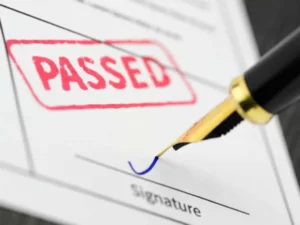
Depending on the purpose, polygraph results are often shared with third parties like employers or prosecutors. Ask the examiner who will receive their report and have access to your private information. This helps avoid unwanted surprises down the road.
Being well-versed is key to maximizing polygraph accuracy and feeling empowered throughout the experience. Don’t hesitate to keep asking questions before, during and after your test. Any careful examiner will appreciate your engagement and interest in the process. Using the opportunity to gain information will lead to better outcomes.
Best Practices for Examiners
Examiners have great responsibility. The results of their work can have life-changing implications for the examinees. They should stick to strict standards and practices when administering tests. Here are some of the most important:
- Use validated polygraph techniques: Rely on proven question types and measurement approaches that are most likely to yield accurate outcomes when applied appropriately.
- Maintain proper licensing and training: Complete all required training and maintain ongoing continuing studies to stay current on polygraph practices. Know the laws and standards in your state.
- Explain the full process to examinees: Walk examinees through what to expect during testing, how measurements work, questioning techniques and more. Promote transparency.
- Develop rapport with examinees: Conduct yourself in a calm and professional manner. Listen to examinees’ concerns and establish trust. A comfortable examinee cooperates better.
- Ask clear and relevant questions: Only ask about 4-5 important questions. Ensure they are clear and not confusing. Avoid overly broad questions.
- Make adjustments as warranted: If an examinee seems nervous, cold, or unable to remain still, pause and remedy the situation before continuing.
- Allow examinees to explain reactions: Do not make unilateral decisions. Let examinees provide context for any concerning reactions first.
- Report truthfully: Be fully responsible and truthful in reporting and representing results. Disclose any uncertainties and avoid exaggeration.
- Maintain confidentiality: Protect examinees’ privacy. Only share their information and results as required by law and authorized by the examinee.
- Keep policies current: Update consent forms, disclosures, and retention policies regularly to follow regulations and best practices.
Red Flags in a Polygraph Examiner
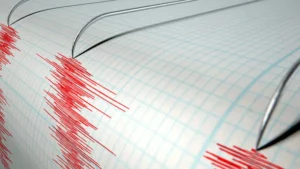
While most examiners are professionals, beware of red flags that may indicate someone who engages in unethical or invalid testing practices. Watch out for examiners who:
- Don’t explain procedures upfront: Trustworthy examiners are transparent and give you information; they have nothing to hide.
- Refuse or discourage you from recording: Reputable examiners allow you to record your test. Be wary if they refuse.
- Claim extremely high accuracy rates: No test is infallible. Accuracy rates over 95% suggest exaggeration or dishonesty.
- Won’t give references or credentials: Ask to verify their reputation and training with past clients or professional associations.
- Pressure you to confess before the test: A proper test doesn’t assume guilt beforehand. Beware of bullying or coercion.
- Refuse to consider alternate explanations: Valid examiners will fairly evaluate whether reactions may reflect other factors besides deception.
- Rush you or won’t let you take breaks: Polygraphs can take 1-2 hours. Beware of examiners trying to rush through in 20 minutes or less.
- Won’t provide written reports: Quality examiners give documentation of procedures, questions asked, results, and conclusions.
- Share your results improperly: Other than any authorized pre-determined parties, an accountable examiner will keep your results private and confidential.
Trust your gut. If an examiner seems suspicious, unprofessional or makes you feel unsafe, end the test and consider reporting them to the proper state licensing authorities.
Questions to Ask Yourself Before a Test
Before your polygraph, also reflect inwardly and ask yourself these questions to set the right mindset:
- Why exactly am I taking this test? Clarify your motivations, whether it’s to demonstrate innocence or as part of a workplace requirement or investigation.
- Do I intend to answer all questions honestly? If your aim is to beat the test through countermeasures, remind yourself those tactics rarely work and are often illegal.
- Am I emotionally capable of handling this today? If you feel extraordinarily tired, stressed or unwell, consider rescheduling until you can be in a calmer state of mind. Don’t take the test impaired.
- How can I mentally prepare? Give yourself adequate time to rest, relax and feel focused before the test. Briefly meditate or do light breathing exercises.
- What is my goal outcome? Decide your purpose – i.e. to have your truthful answers confirmed by the test. Hold that goal in mind.
- Am I clear on the questions I’ll be asked? If the examiner hasn’t provided the exact questions in advance, request them beforehand so you can formulate responses.
- Do I have any uncertainties about the process? Make a list of Remaining questions and get them answered by the examiner before the test begins.
- Am I properly hydrated? Drink enough water in the hours beforehand. Being dehydrated can affect the accuracy of the polygraph results.
Key Takeaways
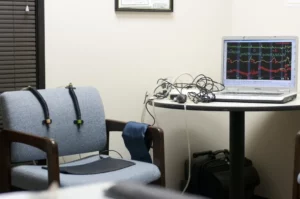
- Ask your polygraph examiner detailed questions about their background, the testing process, and their policies.
- Understand exactly how the equipment works and what physiological indicators the polygraph will measure.
- Do not hesitate to speak up during the test if a question seems unclear or you need a break.
- Find out how the examiner will score the test and share the results. Seek opportunities to explain any concerning reactions.
- Watch for red flags like refusal to explain procedures, claiming unrealistic accuracy rates, or intimidation tactics.
- Take time before the test to reflect on your motivations, prepare mentally, and affirm your commitment to honesty.
Being aware and engaged leads to better polygraph experiences and results. Get your questions answered so you know what to expect. Take the opportunity to gain information, provide context when warranted, and clarify uncertainties. A professional examiner will happily explain their protocols, technology, and approach – so don’t be afraid to ask. With knowledge comes power and comfort. You’ve got this!

